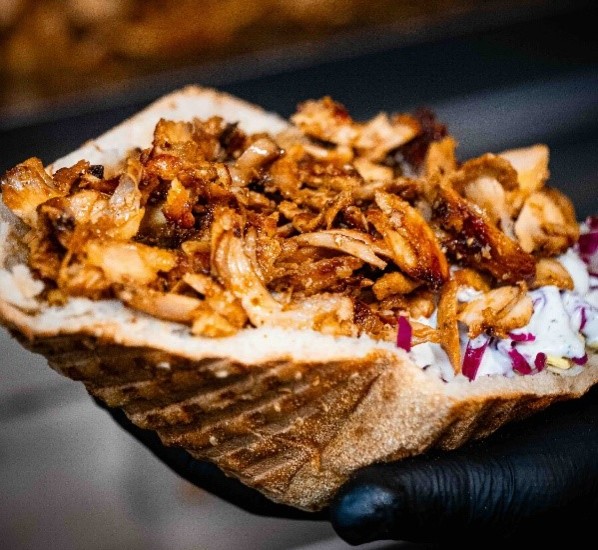By Alex Berger
It was lunchtime at the Yangtse Restaurant, the only kosher eatery in town. At one table the Chinese waiter took the order in Hebrew, making small talk in that language with the diners as they studied the menu. The meal over, a customer paid at the desk and remarked to the Jewish owner, “I never saw a Chinese man speak Hebrew before.”
The owner pulled the customer to the side and said, “Shh. He thinks he is learning English.” – Fortune Cookie No. 1212.
On Jan. 22 the Chinese New Year of 4702, borough Asians were to ring in the Year of the Monkey with local festivities and parades, such as the one in Flushing. This is all in honor of the Lunar New Year, celebrated by Koreans, Vietnamese and other peoples. This holiday is fixed according to the lunar calendar, on the date of the second new moon after the winter solstice.
This ancient calendar is 2,697 years older than ours. Incidentally, China and many other Asian countries have since switched from the lunar calendar to the Gregorian or Western one.
The number 2,697 boggles my mind. It is a greater figure than the total equivalent of 12 Andy Rooney lifetimes, 12 Methuselah lifespans and 12 years of my writing this column. Why 12 years? Read on.
Each Lunar New Year is named for a different animal in a rotating series of 12 animals. Why 12? Well, I got this straight from a fortune cookie. All the animals in the world were invited to a planned party for Buddha (the ancient Chinese religious leader); however, only 12 thought it important enough to attend. So these animals were honored by having years named after them.
This rotating sequence has not been broken in 47 centuries. (Do you think the New York Mets will ever be able to match that number in losing seasons?) The Chinese say that the animals ruling the year in which you were born will influence your life.
The monkey, which symbolizes the ninth year of the 12-year cycle, replaces the Ram as the next animal in the Chinese zodiac. The monkey and his chimp, ape and gorilla relatives (no, King Kong was not invited) will be called upon to stand front and center and represent 2004.
The 12-year sequence always starts with the Rat, followed by the Ox, the Tiger, the Rabbit, the Dragon, the Snake, the Horse, the Ram, the Monkey, the Rooster, the Dog and the Boar. Remarkably, this rotating sequence has been repeated for more than 4,702 years.
People who are monkeys (no offense intended), those born during the monkey years of 1944, 1956, 1968, 1980, 1992 and 2004, are serious, intelligent, funny, influential and strive to excel (but do not always succeed). They possess good social skills, are enthusiastic, imaginative, persuasive, problem-solvers, resourceful, versatile and great achievers. But they are also mischievous, shy, restless, manipulative, impudent, superficial, easily discouraged and become confused at times.
The quick-witted monkeys can also assess situations in a moment, enjoy attention, are stimulating partners and make good lawyers and politicians. But according to an unimpeachable source — a fortune cookie — they will have a trying 2004, swinging to and fro, trying to resolve business and health problems. Former Mayors Ed Koch, Rudy Giuliani and Mario Cuomo are “monkeys.” All in all, being a monkey is not bad.
The Lunar New Year has always been the most important and popular of the Chinese festivals. It is a time for the clearing away of any bad luck in the old year and obtaining a clean, fresh slate for the next. It is believed that various God-like spirits report what occurred during the past year to the ruler of heaven, the Jade Emperor. Doesn’t this sound exactly like Santa Claus and the list he checks twice to find out who was naughty and nice?
Many of the Chinese revelers open the celebration by burning a paper image of the evil god Tsao Wang. This ritual is done supposedly to send him on his way one week before the new year. Don’t you wish that burning a paper image of terrorists would send them on their way?
Exploding firecrackers will pop and crackle; they are an essential part of the celebration. Crashing cymbals and rolling drums complement the fireworks. Besides delighting revelers, the loud noises are said to pave the way for the kitchen god (no, it is not Emeril).
The Chinese love the kitchen because that is where food is prepared.
They will eat fish for luck, dumplings for change, rice cakes for progress and soup balls (matzo balls?) for unity. This is in addition to their staple, pork. A giant golden dragon will zigzag down the street along with the make-believe lions and colorful floats. And children receive red envelopes containing “lai see,” or lucky money.
The best thing I like about this celebration is eating at my favorite Chinese restaurant, the Evergreen, in Whitestone, where I read fortune cookies. When you talk about big things coming in small packages, you are talking about Chinese fortune cookies. Their sage advice packs a big punch. Reading them is a philosophical experience, such seeing the sun shining over a mulberry bush or a horse eating but one oat.
Digest these examples of pure logic: “No man is lonely while eating Chinese noodles — it takes so much attention”; “When you play solitaire, cut the deck first”; and, “It is always darkest before the light bill is paid.” Ponder these truths daily and you will become healthy, wealthy and wise.
As I leave you to your pondering, Gloria and I wish all my Asian and “monkey” readers “Gung Hay Fat Choy” (wishing you prosperity) and “Shin Niam Kwai Le” (Happy New Year). Now excuse me as I have an appointment with a spare rib and a few fortune cookies.
Reach columnist Alex Berger by e-mail at timesledger@aol.com or call 718-229-0300, ext. 140.



































